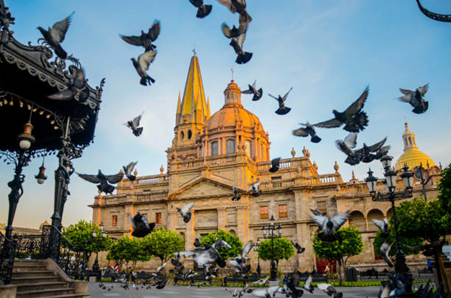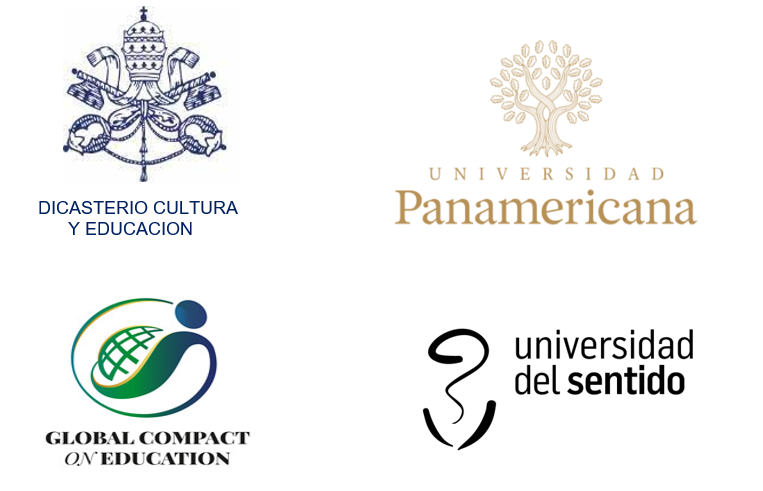
Purpose
The purpose of the Congress is to bring together professors and researchers from the universities that are members of the Scholas Chairs Program and personalities from the religious world, culture, the third sector, social movements, business, trade unions, diplomats, government officials and all those interested in being part of an opportunity for cooperation and learning around education as the main instrument for social change. In particular, it adheres to Pope Francis' invitation to renew and relaunch university institutions towards a model committed to the anthropological and socio-environmental crisis in an “exit” process, beyond the very walls of higher education institutions.
Goals
Reflect on the contribution that the Scholas Chairs can make to inhabit a renewed model of university capable of:
- Respond to the personal and interpersonal needs of the students.
- Listen to young people, promote creative autonomy and celebrate their creations.
- Manage a climate of fraternal coexistence that understands diversity as an enriching factor.
- Unify teaching, research and extension in the commitment to the local and global reality
- Lead research and transformation processes for technological and social innovation
HERE you can see the summary video of the previous Congress
Previous congresses:
2016: Pontificial Academy of Sciences (Vatican City) with the participation of 40 universities from 14 countries.
2017: Catholic University of Valencia (Spain) with the participation of high ecclesiastical authorities and academics from Spanish Universities.
2017: Harry Truman Institute of the Hebrew University of Jerusalem with the participation of 41 universities from 20 countries.
2018: Castelgandolfo (Italy) with the participation of 75 universities from 30 countries.
2019: Fordham University in New York (USA), with the participation of 80 universities from 35 countries.
2021: Universidad San Pablo CEU, Madrid, Spain, with more than 35 countries with hybrid modality.
2022: Universidad Católica Silva Henríquez, Chile, with more than 40 countries with hybrid modality.
Axes
- Mobility of students for the development of curricular practical work with social impact
- Innovation and technology transfer with a social impact in both the sciences and the humanities
- Teaching and research with new ethical and methodological approaches
- "Lifelong" Training Offer in face-to-face modality, online modality and hybrid mobility,
- Generation of funds for research and the mobility of students and professors.
Schedule
Based on the evaluations and suggestions of the participants in the 2022 congress, this year a methodology focused on dialogue and the exchange of ideas and opinions will be deepened based on specific experiences developed by Scholas and by the Scholas Chairs
The activities include Workshops, Presentation of experiences and Dialogue Communities.
Some topics that will be worked on in the Workshops:
Universities in the key of “movement”
What does it mean to be a university today? What are the future prospects? What does it mean to be part of Scholas within the university itself? How can the Scholas Chairs be part of the Scholas Movement? How can the Scholas Chairs contribute to the evolution of the university towards the future university? With the participation of international specialists we will try to answer the above questions.
The sense of educating for commitment to public, political and social life
In 2023, a group of Psychology students from the Universidad Panamericana (Aguascalientes campus) visited the Scholas’ headquarters in the Argentine Chaco to develop professional practices related to the problem of addictions. Based on this initiative, a table of international specialists will discuss the need to multiply this type of learning experience.
The sense of relationships between young people and adults
Based on the BEING TOGETHER initiative (the Erasmus + Voices project is presented, carried out in collaboration with the PAOK association and the University of Zaragoza) developed in Spain, we will discuss the dialogue between generations and the possibility of bringing the language of young people closer to the language of adults with the intervention of international specialists.
Education as a path to a culture of meaning
Scholas has developed the Scholas Citizenship program since its inception. During 2022 and 2023, the young people who participated in these experiences in different countries and continents agreed to express their pain for the mental health of adolescents. With the participation of international specialists, we will discuss the need to generate intervention strategies where young people can find meaning in their lives and discover their future project.
The sense of fraternity
All the continents experience to a greater or lesser degree migratory movements that originate in war, poverty or climatic changes and require the attention of public policies. The academic world cannot set itself apart of this pain of the whole humanity. Among all of us and with the participation of international specialists, we will lay the foundations to build an initiative that responds to this problem and which we can follow up through the University of Meaning.
The sense of teaching and research for community development
The Scholas Chairs propose a university model where teaching and research are committed to solving the pain of the community. This means ceasing to consider university extension as an area divorced from the curriculum. Based on the experience implemented by the Scholas Chair of the LUMSA University of Rome in Porto Torres, Sardinia, linking different community actors, we will discuss this new organizational approach to Higher Education.
The meaning of a University of Meaning
Why did the Pope launch the University of Meaning? What does it mean for the Scholas Movement? What can the UoM contribute to the Scholas Chairs? And what can the UoM receive from the Scholas Chairs? Based on the situation of the UoM construction process, we will try to answer the above questions.
Beyond professions. Present and future of the Scholas Chairs
Based on the particular case of the Scholas Chair at the National University of Córdoba, we will discuss in general based on these questions: How did the university change after creating the Scholas Chair? Especially in turning the extracurricular into curricular. Before the arrival of Scholas, did we do it like this? Do we do it differently now? What is the University of Meaning? What is a Scholas Chair? What is service learning for a Scholas Chair? What does the university give Scholas? What does Scholas give to the University?
Universities and productive world
In the process of tearing down walls, the current university needs to relate to productive companies with the purpose of offering their innovations. We will discuss the mutual benefits of Technology Transfer processes with social and educational impact.
In Scholas Chairs Congress EVERY ONE of the participants is a PROTAGONIST of the program.
Find HERE the Conclusions of the last Congress.
Find HERE the list of confirmed speakers.
Find HERE the program of activities for Higher Education students.
Presentation of experiences
You are invited to write and send abstracts for the presentation of face-to-face oral communications and virtual oral communications.
Face-to-face oral communication: the authors who personally participate in the congress will have ten minutes to socialize their paper.
Virtual oral communication: authors who participate remotely must send a ten-minute video presentation of their paper (asynchronously) Virtual exhibitors will pay only 20 euros for registration.
They should focus on one of the axes and describe a concrete experience of transformation of reality. The three languages ??that Pope Francis proposes to transform education must be present: "the language of the mind, the language of the heart and the language of the hands"
Criteria of the evaluation commission:
- A real experience that responds to a problem of the university itself or of the community is analyzed.
- The protagonists of the experience are the students.
- The LISTEN-CREATE-CELEBRATE methodology is applied
- Appeals to the languages of the head, the heart and the hands at the same time
Abstract (maximum 500 words) in Spanish and English, in Italian and English, or in English for English-speaking exhibitors. Arial font of 12 points to single line. Keywords (maximum 5) in 12 point Arial bold font.
Title, centered, in 14 point Arial bold font. Indicate the chosen Axis.
• Name of the author and co-authors aligned to the right in 12 point Arial bold font.
• E-mail address of the authors and the name of the Institution to which they belong in 10 point Arial italic single line.
Important dates:
Abstract submission deadline: August 10th, 2023
Communication evaluation return date: August 30th, 2023
Delivery of the works in full: January 31st, 2024
SEND YOUR ABSTRACT TO scholaschairs@scholasoccurrentes.org
Write “Abstract 2023 Congress” in the Subject
Place:
Universidad Panamericana – Campus Guadalajara, Estado de Jalisco, México.
Watch the video HERE
Access HERE all the useful information to move around the university campus and Guadalajara City.
Accomodation:
Registration:
You must complete the registration form HERE
and pay the contribution:
|
Contribution (EURO) |
||
|
|
3/03/23 to 30/5/23 |
Pay |
|
Participants from universities or observer organizations registered in Scholas Chairs until December 31 2022 |
100 |
|
|
Participants who do not belong to universities or observer organizations registered in Scholas Chairs |
150 |
|
| Participants who present papers online and do not attend in person | 20 | |
Teachers and Students of the Universidad Panamericana are exempt from paying the contribution.
Scientific Comittee
Chairs:
Prof. Italo Fiorin (Universita LUMSA, Italia – Universidad del Sentido)
Dra. Fernanda Llergo Bay (Universidad Panamericana, México)
Members:
| Dr. Angelo Paletta | Università di Bologna | Italia |
| Dr. Giuseppe Milan | Università di Padova | Italia |
| Dr. Nicola Andrian | Universidade do Estado da Bahia | Brasil |
| Dr. Domenico Simeone | Università Cattolica del Sacro Cuore | Italia |
| Dr. Paulo Fossatti | Unilasalle | Brasil |
| Dr. Hugo Juri | Universidad Nacional de Córdoba – Universidad del Sentido | Argentina |
| Dra. Rita Gajate | Universidad Católica de La Plata | Argentina |
| Dr. Martinien Bosokpale | Catholic University of Congo | RD Congo |
| Dr. Iordan Barbulescu | Universidad de Estudios Políticos y Administrativos | Rumania |
| Dr. Osvaldo Cano Torres | Pontificia Universidad Bolivariana de Medellín | Colombia |
| Dr. Franklin Holguín Haché | Universidad APEC | República Dominicana |
| Dra. Sílvia Albareda Tiana | Universidad Internacional de Catalunya | España |
| Dra. Yolanda Ruiz Ordoñez | Universidad Católica de Valencia | España |
| Dr. Andrés Ramos Castro | Universidad San Pablo CEU | España |
| Dra. Carmen Rosales Varo | Centro del Magisterio la inmaculada de la Universidad de Granada | España |
| Dr. Andrew Furco | Minnesota University | EEUU |
| Dr. Gerald Cattaro | Fordham University | EEUU |
| Dra. Ruth Fine | Hebrew University in Jerusalem | Israel |
| Dr. Mauricio Dimant | Hebrew University in Jerusalem | Israel |
| Dr. Mustafa Cenap Aydin | Istituto Tevere | Italia |
| Dr. Ahmet Oztas | Epoka University | Albania |
| Dr. Francisco Carballo | Goldsmith University of London | Reino Unido |
| Dr. Huseyin Sert | Nile University | Nigeria |
| Dr. Jorge Ferrao | Universidade Pedagogica | Mozambique |
| Dr. Pedro Rosario | Universidad de Minho | Portugal |
| Dra. Gabriela Valdivieso | Universidad Panamericana | Mexico |
| Dra. Zehavit Gross | Universidad Bar Ilan | Israel |
| Dr. Walter Wallach | Universidad Nacional de Hurlingham | Argentina |
| Dra. Monserrat Llairó | Universidad de Buenos Aires | Argentina |
| Dra. Maria Cinque | Universitá LUMSA | Italia |
| Dr. Manuel Sanchez Fandila | Universitá della Santa Croce | Italia |
| Dr. Carlos Quenan | Institut des Amériques | Francia |
| Dr. Pasquale Policastro | Szczecin University | Polonia |
| Dr. Betullah Colak | Respect Graduate School | USA |
| Dr. Ferdinand Gjana | Western Balkan University | Albania |
| Dr. Rodrigo De Andrade | Pontificia Universidade Catolica de Parana | Brasil |
| Dr. Milton Pellegrini | Pontifcia Universidade Catolica de Sao Paulo | Brasil |
| Dr. Nestor Dermot | Catholic University of Australia | Australia |
| Dr. Francisco de Ferari Correa | Universidad Católica Silva Henriquez | Chile |
Evaluation Committee
Coordinador: Dra. Rocío Martinez (Universidad de Lasalle, Mexico)
Integrantes:
Dr. Rodrigo Martin, Universidad Católica de La Plata, Argentina
Dr. Guillermo Kerz, Universidad Católica de Santa Fe, Argentina
Dr. Miguel Francisco Gutiérrez, Universidad de Buenos Aires, Argentina
Dr. Gabriel Asprella, Universidad Nacional de Tres de febrero, Argentina
Dra. Daniela Santillán, Universidad del Salvador, Argentina
Dr. Diego Chacón, Universidad Tecnológica de Honduras
Dr. Gustavo Albornoz. Universidad Católica Silva Henriquez, Chile
Dr. Antony Luby, Robert Gordon's College, Aberdeen, UK
Dr. Jesús Aceves Loza, Fordham University, USA
Dr. Angelo Ferreira, Universidade Pedagogica de Maputo, Mozambique
Dra. Isabel Vilanculos, UNISAVE, Mozambique
Dra. Irene Culcasi, Universita LUMSA, Italia
Dra. Candy Lisbeth Ocaña Zúñiga, Universidad Nacional de Jaén, Perú
Dissemination Committee
Coordinator: Pedro Beltrán Santiago (Cátedras Scholas México)
Members:
Dra. Maya Gonzalez Bender, Universidad ISALUD, Argentina
Dra. Silvana Bragatto, Instituto Casa Común, Brasil
Dra. Cleia Zanatta, Universidade de Petropolis, Brasil
Dra. Tânia Maria Hetkowski, Universidade do Estado da Bahia, Brasil
Dr. Juan Carlos Torre Puente, Centro Universitario ESCUNI, España
Dra. Caren Rodrigues, St Joseph institute of Management, India
Dra. Mariola Kozubec, Silesia University, Polonia
Dr. Edimer Albeiro Pardo Flórez, Universidad La Gran Colombia
Dra. Elsa María Moquete Cruz, República Dominicana
Dr. Lazare Rukundwa Sebitereko, Eben Ezer, University, RD Congo
Publications Committee
Coordinator: Dra. Lourdes Caudillo (Universidad Iberoamericana, México)
Members:
Dr. Agustín Domingo Moratalla, Universidad de Valencia, España
Dra. María Assumpta Aneas, Universidad de Barcelona, España
Dr. José Victor Orón Semper, Fundación UpToYou, España
Dra. Paula Luengo Kanacri, Universidad Católica de Chile
Dra. Gabriela Azar, Universidad Católica Argentina
Dra. Andrea Hernández, Universidad tecnológica de Pereira, Colombia
Dra. Susana Pesis de Werthein, Fundación Tesa, Argentina-Israel
Dr. Rui Marques, Academia Ubuntu, Portugal
Dr. Jean de Dieu Tagne, Institut Calasanz du Droit à l'Education, Camerun
Ing. Patrik Attie, Ecole Supérieure d'Infotronique d'Haïti
Dr. Zeki Saritoprak, John Carroll University, USA
Dr. Mohamed Abdulghani, Tishk University, Irak
Dr. Julio Cesar Durand, Universidad Austral, Argentina
Dra. Hildegard Jung, Unilasalle, Brasil
Dr. Juan Luis Fuentes, Universidad Complutense, Madrid
Content Committee
Dr. Italo Fiorin, Universita LUMSA, Italia y Universidad del Sentido, Ciudad del Vaticano
Dra. Daniela Salgado, Universidad Panamericana, México
Dra. María Paz Jurado, Universidad del Sentido, Ciudad del Vaticano
Dr. Daniel Stigliano, Universidad de Buenos Aires y Universidad del Sentido, Ciudad del Vaticano
Dr. Pablo Tejada Romero, Universidad de Granada y Universidad del Sentido, Ciudad del Vaticano
Dra. Norma Peschard Gutierrez, Universidad Anahuac, Mexico y Cátedras Scholas México
Organization Committee
Moira Massonneau (Scholas)
Leoncio Monjarás Wintergerst (Universidad Panamericana, México)
Guido Tomás Savall (Scholas México)
Alejandro Lamberti (Scholas)
Daniel Gentile (Scholas Cátedras)
Stella Maris Poli (Scholas Cátedras)
Eugenio Visiconde (Scholas Cátedras)
Juan Fresno (Scholas Mozambique)
Daniela Stigliano (Scholas Cátedras)
Lucila Kairuz (Scholas Argentina)
Edgardo Broner (Scholas Cátedras)
Ana Fabiola Mora López (Universidad Panamericana)
General Coordination
Dr. Daniel Stigliano, Universidad de Buenos Aires y Universidad del Sentido, Vaticano
Dra. Daniela Salgado, Universidad Panamericana, México

